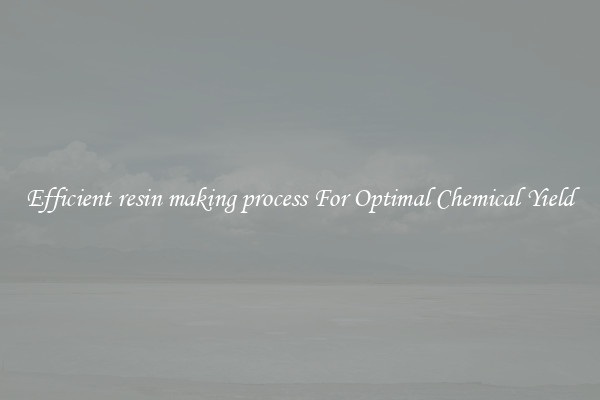Efficient resin making process For Optimal Chemical Yield
Resin is a crucial component in various industries, including pharmaceuticals, adhesives, and coatings. The process of making resin involves several steps to ensure optimal chemical yield and efficiency. By following an efficient resin-making process, manufacturers can maximize their output and reduce waste.

One key step in the resin-making process is proper selection of raw materials. It is important to choose high-quality materials that meet the desired specifications for the final product. Using substandard materials can result in poor product quality and lower yields.
Another crucial aspect of the resin-making process is the mixing and blending of ingredients. Proper mixing ensures that all components are evenly distributed, resulting in a homogenous product. This step is essential for achieving the desired chemical properties of the resin.
Temperature control is also critical in the resin-making process. Different types of resins require specific temperature ranges for optimal chemical reactions. Maintaining the correct temperature throughout the process is essential for achieving the desired product properties and maximizing chemical yield.
Proper filtration and purification of the resin are important for removing impurities and contaminants that can affect the quality of the final product. By using efficient filtration methods, manufacturers can ensure that the resin meets the required purity standards.
Automation can also play a significant role in improving the efficiency of the resin-making process. Automated systems can help streamline production, reduce human error, and increase overall productivity. By implementing automated processes, manufacturers can optimize their chemical yield and minimize waste.
In conclusion, the resin-making process requires careful attention to detail and adherence to best practices to achieve optimal chemical yield. By selecting high-quality raw materials, properly mixing and blending ingredients, controlling temperature, filtering and purifying the resin, and implementing automation, manufacturers can produce high-quality resin efficiently. Efficient resin-making processes not only improve product quality but also enhance productivity and reduce costs. By investing in optimizing their resin-making processes, manufacturers can stay competitive in the market and meet the growing demand for high-quality resins.

View details

View details

View details

View details








